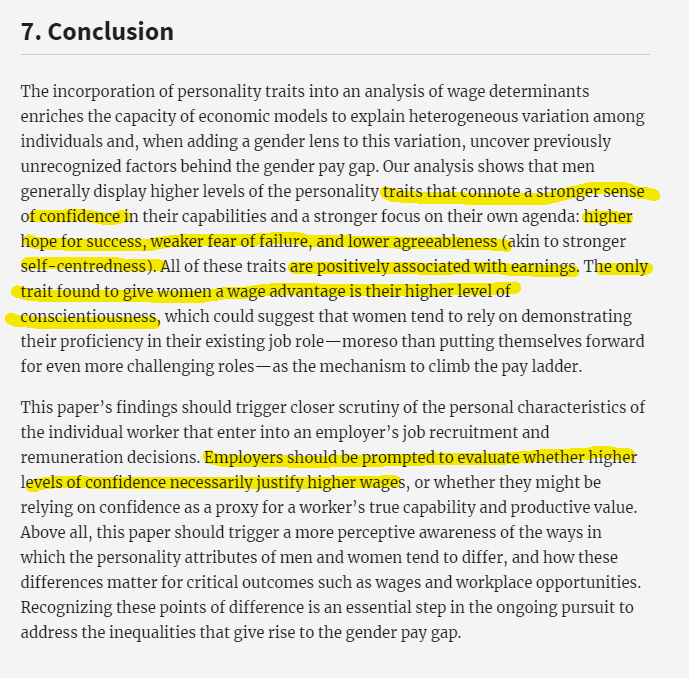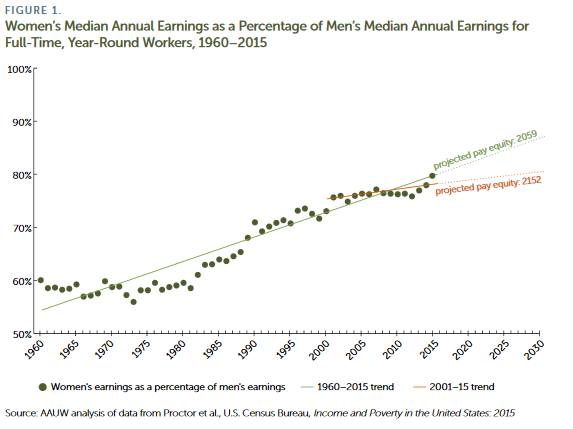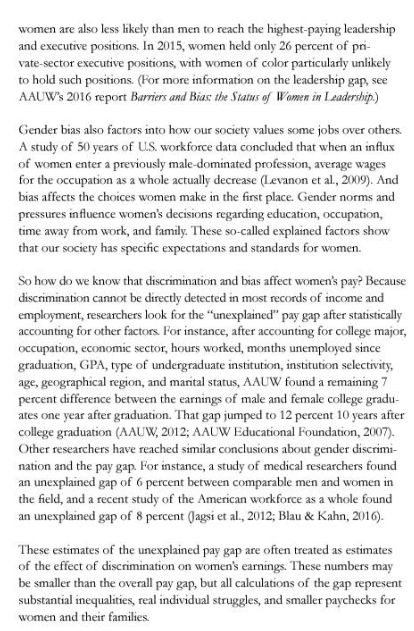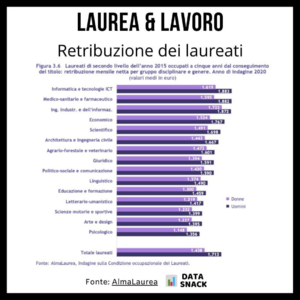Gender Wage Gap: differenze tra le versioni
Nessun oggetto della modifica |
Nessun oggetto della modifica |
||
| Riga 3: | Riga 3: | ||
{{S}} | {{S}} | ||
[[File:66799114496e54a2186cd3dbb300e06b.png|nessuno|riquadrato|7. Conclusion The incorporation of personality traits into an analysis of wage determinants enriches the capacity of economic models to explain heterogeneous variation among individuals and, when adding a gender lens to this variation, uncover previously unrecognized factors behind the gender pay gap. Our analysis shows that men generally display higher levels of the personality '''traits that connote a stronger sense of confidence''' in their capabilities and a stronger focus on their own agenda: '''higher hope for success''', weaker fear of failure, and '''lower agreeableness''' (akin to stronger self-centredness). All of these traits are positively associated with earnings. '''The only trait found to give women a wage advantage is their higher level of conscientiousness''', which could suggest that women tend to rely on demonstrating their proficiency in their existing job role-moreso than putting themselves forward for even more challenging roles-as the mechanism to climb the pay ladder. This paper's findings should trigger closer scrutiny of the personal characteristics of the individual worker that enter into an employer's job recruitment and remuneration decisions. '''Employers should be prompted to evaluate whether higher levels of confidence necessarily justify higher wages''', or whether they might be relying on confidence as a proxy for a worker's true capability and productive value. Above all, this paper should trigger a more perceptive awareness of the ways in which the personality attributes of men and women tend to differ, and how these differences matter for critical outcomes such as wages and workplace opportunities. Recognizing these points of difference is an essential step in the ongoing pursuit to address the inequalities that give rise to the gender pay gap.]] | |||
* [https://academic.oup.com/oep/article/70/4/919/5046671 Personality and pay: do gender gaps in confidence explain gender gaps in wages?] | |||
* [https://data.oecd.org/earnwage/gender-wage-gap.htm?fbclid=IwAR2MuwuIHHZwdGP4KYxxKeuwoxAMg2OlfmOXovQ9vySjUHZPa3PCwdTUORc#indicator-chart OECD Data Gender Wage Gap chart] | |||
[https://academic.oup.com/oep/article/70/4/919/5046671 Personality and pay: do gender gaps in confidence explain gender gaps in wages?] | |||
[https://data.oecd.org/earnwage/gender-wage-gap.htm?fbclid=IwAR2MuwuIHHZwdGP4KYxxKeuwoxAMg2OlfmOXovQ9vySjUHZPa3PCwdTUORc#indicator-chart OECD Data Gender Wage Gap chart] | |||
È verosimile che esista, ma le cause non sono così semplicistiche come si vuol far credere (ovvero che i datori di lavoro siano tutti dei maschilisti di merda che ritengono che le donne debbano stare a casa a fare figli). | È verosimile che esista, ma le cause non sono così semplicistiche come si vuol far credere (ovvero che i datori di lavoro siano tutti dei maschilisti di merda che ritengono che le donne debbano stare a casa a fare figli). | ||
Avevo visto un video di uno psicologo americano (mi pare fosse psicologo), che spiegava come le donne fossero mediamente meno "prepotenti" (in senso buono) degli uomini, e che questo incideva sul loro avanzamento di carriera. Il che potrebbe essere vero. | Avevo visto un video di uno psicologo americano (mi pare fosse psicologo), che spiegava come le donne fossero mediamente meno "prepotenti" (in senso buono) degli uomini, e che questo incideva sul loro avanzamento di carriera. Il che potrebbe essere vero. | ||
| Riga 18: | Riga 14: | ||
Difatti sembra esistere un pay gap interno tra le donne che non hanno mai avuto figli (che hanno paghe simili agli uomini) e quelle che hanno avuto figli. | Difatti sembra esistere un pay gap interno tra le donne che non hanno mai avuto figli (che hanno paghe simili agli uomini) e quelle che hanno avuto figli. | ||
[[File:F1ada8fac4c7d78cb2579b1459ae9b6b.png|nessuno|riquadrato]] | [[File:F1ada8fac4c7d78cb2579b1459ae9b6b.png|nessuno|riquadrato|Women's Median Annual Earnings as a Percentage of Men's Median Annual Earnings for Full-Time, Year-Round Workers, 1960-2015]] | ||
Leggendo altri studi risulta che ancora non siamo alla perfetta parità.. | Leggendo altri studi risulta che ancora non siamo alla perfetta parità.. | ||
Secondo (Jagsi et al., 2012; Blau & Kahn, 2016 [forse il paper è [https://pubs.aeaweb.org/doi/pdf/10.1257/jel.20160995 The Gender Wage Gap: Extent, Trends, and Explanations]?]) rimane ancora un 6 - 8% di gap di salario difficilmente spiegabile a parità di mansione. | * Secondo (Jagsi et al., 2012; Blau & Kahn, 2016 [forse il paper è [https://pubs.aeaweb.org/doi/pdf/10.1257/jel.20160995 The Gender Wage Gap: Extent, Trends, and Explanations]?]) rimane ancora un 6 - 8% di gap di salario difficilmente spiegabile a parità di mansione. | ||
* Come specifica qui [https://hhl-oh.aauw.net/files/2014/02/Simple-Truth-Fall-2016.pdf THE SIMPLE TRUTH ABOUT THE GENDER PAY GAP FALL 2016 EDITION] | |||
Come specifica qui [https://hhl-oh.aauw.net/files/2014/02/Simple-Truth-Fall-2016.pdf THE SIMPLE TRUTH ABOUT THE GENDER PAY GAP FALL 2016 EDITION] | * [https://www.nejm.org/doi/full/10.1056/NEJMsa053910?fbclid=IwAR3n3l69Ki3XPl_OMxa0Ck3GZ1XSBPhrGP-6GlxWlcpGfpjcre1vcKqweGc The “Gender Gap” in Authorship of Academic Medical Literature — A 35-Year Perspective] | ||
[[File:A3839a152c6fc4ecc16a5a18afb22f5e.png|nessuno|riquadrato|women are also less likely than men to reach the highest-paying leadership and executive positions. In 2015, women held only 26 percent of pri vate-sector executive positions, with women of color particularly unlikely to hold such positions. (For more information on the leadership gap, see AAUW's 2016 report Barriers and Bias : the Status of Women in Leadership.) Gender bias also factors into how our society values some jobs over others. A study of 50 years of US workforce data concluded that when an influx of women enter a previously male-dominated profession, average wages for the occupation as a whole actually decrease (Levanon et al., 2009). And bias affects the choices women make in the first place. Gender norms and pressures influence women's decisions regarding education, occupation, time away from work, and family. These so-called explained factors show that our society has specific expectations and standards for women. So how do we know that discrimination and bias affect women's pay? Because discrimination cannot be directly detected in most records of income and employment, researchers look for the "unexplained" pay gap after statistically accounting for other factors. For instance, after accounting for college major, occupation, economic sector, hours worked, months unemployed since graduation, GPA, type of undergraduate institution, institution selectivity, age, geographical region, and marital status, AAUW found a remaining 7 percent difference between the earnings of male and female college gradu ates one year after graduation. That gap jumped to 12 percent 10 years after college graduation (AAUW, 2012; AAUW Educational Foundation, 2007). Other researchers have reached similar conclusions about gender discrimi nation and the pay gap. For instance, a study of medical researchers found an unexplained gap of 6 percent between comparable men and women in the field, and a recent study of the American workforce as a whole found an unexplained gap of 8 percent (Jagsi et al., 2012; Blau & Kahn, 2016). These estimates of the unexplained pay gap are often treated as estimates of the effect of discrimination on women's earnings. These numbers may be smaller than the overall pay gap, but all calculations of the gap represent substantial inequalities, real individual struggles, and smaller paychecks for women and their families.]] | |||
[[File:A3839a152c6fc4ecc16a5a18afb22f5e.png|nessuno|riquadrato]] | |||
Se consideriamo le preferenze femminili il gap di stipendio si amplia (ma lì non mi pare proprio si possa parlare di discriminazione). | Se consideriamo le preferenze femminili il gap di stipendio si amplia (ma lì non mi pare proprio si possa parlare di discriminazione). | ||
Una professoressa di economia di Harvard dice che non esiste, ritengo la fonte abbastanza affidabile | Una professoressa di economia di Harvard dice che non esiste, ritengo la fonte abbastanza affidabile | ||
[http://www.washingtonexaminer.com/harvard-prof.-takes-down-gender-wage-gap-myth/article/2580405 Harvard prof. takes down gender wage gap myth - Whashington Examiner] | * [http://www.washingtonexaminer.com/harvard-prof.-takes-down-gender-wage-gap-myth/article/2580405 Harvard prof. takes down gender wage gap myth - Whashington Examiner] | ||
* [https://www.youtube.com/watch?v=1oqyrflOQFc PagerU - The Myth of the Gender Wage Gap - Youtube] | |||
[https://www.youtube.com/watch?v=1oqyrflOQFc PagerU - The Myth of the Gender Wage Gap - Youtube] | * [https://www.youtube.com/watch?v=58arQIr882w The gender wage gap uses bogus statistics | FACTUAL FEMINIST - Youtube] | ||
[https://www.youtube.com/watch?v=58arQIr882w The gender wage gap uses bogus statistics | FACTUAL FEMINIST - Youtube] | |||
[[File:F1ada8fac4c7d78cb2579b1459ae9b6b.png]] | [[File:F1ada8fac4c7d78cb2579b1459ae9b6b.png]] | ||
| Riga 56: | Riga 49: | ||
Ma a fronte di questi privilegi manca un fattore fondamentale, e questa mancanza è dovuta a ciò di cui ho parlato prima. Non in tutti i casi, ma in molti, mancano infatti il riconoscimento professionale e il rispetto verso il proprio superiore, soprattutto se donna. | Ma a fronte di questi privilegi manca un fattore fondamentale, e questa mancanza è dovuta a ciò di cui ho parlato prima. Non in tutti i casi, ma in molti, mancano infatti il riconoscimento professionale e il rispetto verso il proprio superiore, soprattutto se donna. | ||
Questo è attualmente, a mio parere, quello su cui bisogna preoccuparci. | |||
[[Categoria:Lavoro]] | [[Categoria:Lavoro]] | ||
[[Categoria:Femminismo]] | [[Categoria:Femminismo]] | ||
[[Categoria:Differenze di genere]] | [[Categoria:Differenze di genere]] | ||
[[Categoria:Questioni controverse]] | [[Categoria:Questioni controverse]] | ||
=== Employment / Perché le donne non lavorano? === | === Employment / Perché le donne non lavorano? === | ||
[[File:Genderwage gap.png|nessuno|miniatura|332x332px]] | [[File:Genderwage gap.png|nessuno|miniatura|332x332px]] | ||
Versione delle 12:22, 11 gen 2023

- Personality and pay: do gender gaps in confidence explain gender gaps in wages?
- OECD Data Gender Wage Gap chart
È verosimile che esista, ma le cause non sono così semplicistiche come si vuol far credere (ovvero che i datori di lavoro siano tutti dei maschilisti di merda che ritengono che le donne debbano stare a casa a fare figli). Avevo visto un video di uno psicologo americano (mi pare fosse psicologo), che spiegava come le donne fossero mediamente meno "prepotenti" (in senso buono) degli uomini, e che questo incideva sul loro avanzamento di carriera. Il che potrebbe essere vero.
Comunque la causa principale dovrebbe essere la maternità.
Difatti sembra esistere un pay gap interno tra le donne che non hanno mai avuto figli (che hanno paghe simili agli uomini) e quelle che hanno avuto figli.

Leggendo altri studi risulta che ancora non siamo alla perfetta parità..
- Secondo (Jagsi et al., 2012; Blau & Kahn, 2016 [forse il paper è The Gender Wage Gap: Extent, Trends, and Explanations?]) rimane ancora un 6 - 8% di gap di salario difficilmente spiegabile a parità di mansione.
- Come specifica qui THE SIMPLE TRUTH ABOUT THE GENDER PAY GAP FALL 2016 EDITION
- The “Gender Gap” in Authorship of Academic Medical Literature — A 35-Year Perspective

Se consideriamo le preferenze femminili il gap di stipendio si amplia (ma lì non mi pare proprio si possa parlare di discriminazione).
Una professoressa di economia di Harvard dice che non esiste, ritengo la fonte abbastanza affidabile
- Harvard prof. takes down gender wage gap myth - Whashington Examiner
- PagerU - The Myth of the Gender Wage Gap - Youtube
- The gender wage gap uses bogus statistics | FACTUAL FEMINIST - Youtube
Disparità stipendi - gender wage gap
ES: Avete agito al pari dei compagni di classe di un asilo, siete passati dal "dimostro che sei meno intelligente" al "ce l'ho più lungo di te", fino ad arrivare al "adesso non ti rispondo più e ti tolgo anche il saluto". Dovreste rivedere il vostro modo di discutere, e ricordarvi che se trovate che sia inutile discutere con qualcuno, sarebbe spesso meglio troncare in tutta eleganza.
Detto ciò: è indubbio che negli ultimi anni si sia spinto per una tutela maggiore delle donne sul posto di lavoro. Nel corso dei miei studi giuridici però, leggendo parecchie cause e dopo aver sviluppato una forte sensibilità ai problemi posti dalla disciplina del diritto del lavoro, ho notato che le donne non chiedono tanto di essere poste su un piano paritario rispetto al tema "salario", chiedono qualcosa di nettamente più profondo.
Il tema delle differenze salariali è stato a più riprese affrontato, ed è stato ribadito che le differenze salariali tra uomo e donna sono ormai un mito al pari del Minotauro. L'analisi degli stipendi di numerose manager in carriera, dirigenti, responsabili ha evidenziato che non vi sono differenze salariali rilevanti, e che spesso la donna percepisce una paga più alta.
Trovo inutile poi che si discuta di differenze salariali a parità di mansioni, soprattutto in società private, dove il salario è determinato a seconda dei compiti della persona, e valutando comunque la situazione patrimoniale e finanziaria della società, per cui è normale che vi siano dirigenti, manager, amministratori, operai con paghe più o meno alte pur concorrendo nello stesso settore.
Secondo punto: come ho già ribadito in un commento a questo post, tutte le statistiche che evidenziano differenze salariali tra uomini e donna postate fino ad ora, non prendono in esame lo stipendio di uomini e donne che svolgono la stessa mansione a parità di condizioni, fringe benefits, premi di produzione e così via. Prendono in esame il reddito annuo *medio* di un campione di uomini e donne che non svolgono le stesse mansioni e lo paragonano, rendendo risultati inutili e faziosi alla causa di cui si discute.
Arriviamo al dunque: avendo letto numerosi casi di eventi accaduti sul posto di lavoro, ho percepito che le donne non chiedono una parificazione a livello economico, bensì una parificazione a livello relazionale. I numerosi casi che ho avuto il piacere di leggere, riportavano infatti spesso realtà nelle quali la donna lavoratrice, seppur dirigente/quadro viene, subdolamente o palesemente, molestata giorno dopo giorno, quasi a voler svilire il suo valore a livello professionale, come se il suo essere donna venisse prima della sua posizione lavorativa.
Questa situazione diviene spesso ingestibile, e non posso che capirlo. A livello lavorativo, la donna ha certamente maggiori privilegi rispetto a un uomo se parliamo di congedi, permessi e così via, anche se il tutto è stato ormai mitigato con l'introduzione del congedo parentale paterno in sostituzione a quello materno in caso di gravidanza, che ancora però fatica a essere accettato dai datori di lavoro.
Ma a fronte di questi privilegi manca un fattore fondamentale, e questa mancanza è dovuta a ciò di cui ho parlato prima. Non in tutti i casi, ma in molti, mancano infatti il riconoscimento professionale e il rispetto verso il proprio superiore, soprattutto se donna.
Questo è attualmente, a mio parere, quello su cui bisogna preoccuparci.
Employment / Perché le donne non lavorano?

Come ottenere aumenti

Una ragazza commenta spiegando la disparità salariale così:
- Ragazza1: Semplicemente perché gli uomini si fanno più spesso avanti per richiedere un aumento rispetto alle donne.
- Ragazza2: mah, io quando lo chiesi mi risposero che non serviva averlo perché ero donna, mentre gli uomini dovevano portare avanti “la famiglia”, io potevo farmi mantenere “per davvero” da un uomo, non dal mio lavoro.
- Ragazza1: eh quello è un caso di un coglione. Nella fabbrica dove lavoro io ragionano in modo simile, tipo "siccome sei donna a casa hai anche altro da fare quindi ti facciamo fare lavori meno faticosi, mentre gli uomini a casa non fanno niente quindi possono faticare qua"
- Ragazzo: Il fatto è che anche con noi inventano mille mila scuse. Io per ottenere aumenti ho sempre fatto colloqui altrove, minacciato di licenziarmi e.. in alcuni casi mi sono licenziato davvero e trasferito all'estero. E io sono un dilettante al confronto di un mio amico, lui non è che gli aumenti glieli concedono, se li prende! È brutto, ingiusto, ma è così. È una guerra..